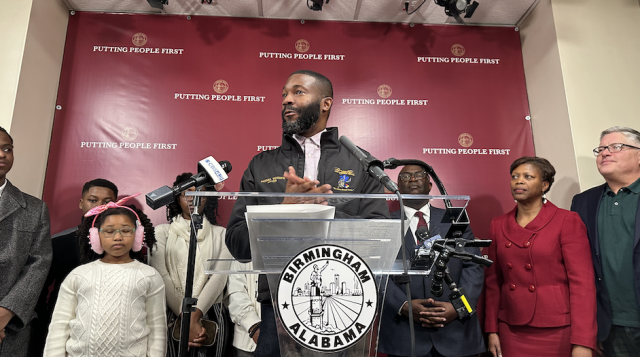
By Ryan Michaels
The Birmingham Times
The city of Birmingham on Wednesday announced yearlong activities to commemorate the 60th anniversary of the 1963 Civil Rights movement.
Mayor Randall Woodfin said 2023 represents a “key milestone,” not only for Birmingham, but also “in the history of our country.”
“…1963 [was a] year that brought much pain and heartache to our city, but the scars show healing. It was the year that we taught our country as well as the world the importance of fighting against injustice, embracing our God-given rights and being voices for those who cannot be heard,” said Woodfin at City Hall.
2023 is also an opportunity to show the progress of the city, Woodfin said.
“In addition to reflecting on the past, we also are excited to show the world how far our city has come, not only in race relations, but also in technology, medicine, banking, and culinary excellence,” said the mayor.
In commemorating the 60th anniversary, the city of Birmingham has named “Forging Justice” the theme for 2023, which is rooted in the city’s industrial and cultural history, according to officials.
The city’s commemoration will be held in partnership with numerous entities in Birmingham.
Some of those include Sixteenth Street Baptist Church, where many of the mass rallies were held in the pivotal 1963 year, as well as Red Mountain Theatre and Make It Happen Theatre Company.
Rev. Arthur Price, who is pastor of Sixteenth Street Baptist Church, where a tragic bombing killed four girls, said the events of 1963 are as important as “Gettysburg, just as important as Valley Forge, just as important as the Boston Tea Party.”
Price pointed to the events of 1963 as something that brought hope to South Africa when the country had intense racial discrimination in the form of apartheid, which was ended in 1994.
“I believe what happened in Birmingham was something that changed the world, was something that rung out to Johannesburg, that made President Nelson Mandela say if change is happening in Birmingham, that we’re very hopeful that change will happen in Johannesburg,” Price said.
It was during 1963 that the famous Birmingham campaign, led by numerous historic Civil Rights fighters including the Rev. Fred L. Shuttlesworth, the Rev. James Bevel and the Rev. Dr. Martin Luther King Jr., took place.
That year produced some of the most iconic stories of the movement, including the Children’s Crusade, when more than 5,000 Birmingham students, some as young as eight, marched in the streets of the city and were arrested in droves.
The next day, May 3, students gathered once again downtown in protest to racial segregation and inequality and were met with firehoses and police dogs sent by infamous public safety commissioner Eugene “Bull” Connor. Images from the day, which were published nationally in the New York Times, shocked the country.
The culmination of the events of the Children’s Crusade, the firehoses and dogs, the arrest of King and his authoring the “Letter from Birmingham Jail” and numerous white supremacist bombings of Black people led to the Civil Rights Act of 1964, which made illegal many of the racist practices carried on in the Jim Crow South.
Woodfin said the theme of “Forging Justice” is rooted in the city’s industrial and cultural history.
“Birmingham is known for steel production and also its racial past. Today, however, just like steel melds together different elements to make a singular strong force, the city has worked to forge relationships among all races, religions, ethnicities and creeds,” Woodfin said.
Other events planned during 2023 include the National Association of Black Journalists’ annual conference in Birmingham in August, the International Peace Conference & Peace Week in May, and numerous tributes to the Civil Rights movement are planned, including a reenactment of the Children’s Crusade.
Each month features a different theme, and citywide programming will correspond. The themes are as follows:
- January – Unity
- February – Black Resistance
- March – Women
- April – Clergy
- May – Children and Youth
- June – Restorative Justice
- July – Environmental Justice
- August – Storytelling
- September – Civil and Human Rights
- October – Social Justice
- November – Arts and Culture
- December – Economic Opportunity
Sara Hamlin, vice president of tourism for the Birmingham Convention and Visitors Bureau, said being intentional about remembering 1963 is a powerful gesture.
“The power of remembering is that you never forget and that history doesn’t repeat itself. What took place and occurred in Birmingham…changed the world, so we see today some of those same things starting to happen again, but we want the young people, as well as America and around the world to know that we can’t repeat history,” Hamlin said.
Denise Gilmore, senior director of the city’s division of Social Justice and Racial Equity, said 2023 can be a year for Birmingham to remember, and bring hope.
“We have an opportunity to reflect on the past while standing united in the continued pursuit of civil and human rights. Our collective work ensures that Birmingham will be an enduring light to the world,” said Gilmore in a statement.
For more information about the year of events, visit https://birminghamal.gov/forgingjustice. A calendar of events will be located there as well as on https://birmingham365.com.
More events and programs will be added in the coming weeks and months.



